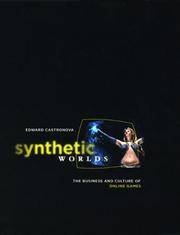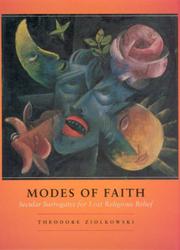| Listing 1 - 4 of 4 |
Sort by
|

ISBN: 0226096262 9786611959326 1281959324 0226096319 9780226096315 9781281959324 6611959327 Year: 2005 Publisher: Chicago University of Chicago Press
Abstract | Keywords | Export | Availability | Bookmark
 Loading...
Loading...Choose an application
- Reference Manager
- EndNote
- RefWorks (Direct export to RefWorks)
From EverQuest to World of Warcraft, online games have evolved from the exclusive domain of computer geeks into an extraordinarily lucrative staple of the entertainment industry. People of all ages and from all walks of life now spend thousands of hours-and dollars-partaking in this popular new brand of escapism. But the line between fantasy and reality is starting to blur. Players have created virtual societies with governments and economies of their own whose currencies now trade against the dollar on eBay at rates higher than the yen. And the players who inhabit these synthetic worlds are starting to spend more time online than at their day jobs. In Synthetic Worlds, Edward Castronova offers the first comprehensive look at the online game industry, exploring its implications for business and culture alike. He starts with the players, giving us a revealing look into the everyday lives of the gamers-outlining what they do in their synthetic worlds and why. He then describes the economies inside these worlds to show how they might dramatically affect real world financial systems, from potential disruptions of markets to new business horizons. Ultimately, he explores the long-term social consequences of online games: If players can inhabit worlds that are more alluring and gratifying than reality, then how can the real world ever compete? Will a day ever come when we spend more time in these synthetic worlds than in our own? Or even more startling, will a day ever come when such questions no longer sound alarmist but instead seem obsolete? With more than ten million active players worldwide-and with Microsoft and Sony pouring hundreds of millions of dollars into video game development-online games have become too big to ignore. Synthetic Worlds spearheads our efforts to come to terms with this virtual reality and its concrete effects. "Illuminating. . . . Castronova's analysis of the economics of fun is intriguing. Virtual-world economies are designed to make the resulting game interesting and enjoyable for their inhabitants. Many games follow a rags-to-riches storyline, for example. But how can all the players end up in the top 10%? Simple: the upwardly mobile human players need only be a subset of the world's population. An underclass of computer-controlled 'bot' citizens, meanwhile, stays poor forever. Mr. Castronova explains all this with clarity, wit, and a merciful lack of academic jargon."-The Economist "Synthetic Worlds is a surprisingly profound book about the social, political, and economic issues arising from the emergence of vast multiplayer games on the Internet. What Castronova has realized is that these games, where players contribute considerable labor in exchange for things they value, are not merely like real economies, they are real economies, displaying inflation, fraud, Chinese sweatshops, and some surprising in-game innovations."-Tim Harford, Chronicle of Higher Education
Internet games --- Economic aspects. --- Social aspects. --- Electronic games --- Computer games --- Television games --- Videogames --- Games --- Video games --- online games, world of warcraft, everquest, entertainment industry, escapism, fantasy, commerce, economics, inflation, fraud, labor, economy, mobility, poverty, wealth, virtual reality, digital currencies, multiplayer, gaming, computer science, second life, psychology, technology, nonfiction, social media, synthetic worlds, telecommunications, video game, trade, internet.
Book
ISBN: 9781571135766 1571135766 9781787442955 1787442950 Year: 2018 Publisher: Suffolk Boydell & Brewer
Abstract | Keywords | Export | Availability | Bookmark
 Loading...
Loading...Choose an application
- Reference Manager
- EndNote
- RefWorks (Direct export to RefWorks)
This book steers attention toward two key aspects of German culture - film and fashion - that shared similar trajectories and multiple connections, looking at them not only in the immediate postwar years but as far back as 1939. They formed spectacular sites of the postwar recovery processes in both East and West Germany. Viewed against the background of the abundant fashion discourses in the Berlin-based press, the films discussed include classics such as The Murderers Are among Us, Street Acquaintances, and Destinies of Women as well as neglected works such as The Heaven Above Us, Martina, Modell Bianka , and Ingrid . These films' treatments of fashion during times of crisis offer subtle reflections on the everyday lives, desires, careers, and self-perceptions of the women who made up a large majority of the postwar public. Costume-in films produced both by DEFA and by West German studios-is a productive site to explore the intersections between realism and escapism and between film and fashion. With its focus on costumes within the context of the films' production, distribution, and reception, this book opens up wider discussions about the role of the costume designer, the ways film costumes can be read as intertexts, and the impact on audiences' behaviors and looks. The book reveals multiple connections between film and fashion, both across the temporal dividing line of 1945 and the Cold War split between East and West. Mila Ganeva is Professor of German at Miami University, Oxford, Ohio.
Fashion in motion pictures. --- Costume --- Costume design --- Motion pictures --- Motion picture actors and actresses --- Fashion --- Symbolic aspects --- History --- Clothing --- Fancy dress --- Opera --- Stage costume --- Theater --- Theatrical costume --- Decorative arts --- Clothing and dress --- Style in dress --- Film actors --- Film stars --- Motion picture stars --- Movie stars --- Moving-picture actors and actresses --- Stars, Movie --- Actors --- Actresses --- And the Heavens above Us. --- DEFA. --- Destinies of Women. --- Escapism. --- Germany. --- Ingrid. --- Martina. --- Modell Bianka. --- Realism. --- Street Acquaintance. --- The Murderers Are among Us. --- West German Studios.

ISBN: 1281966908 9786611966904 0226983668 9780226983660 0226983633 9780226983639 Year: 2007 Publisher: Chicago University of Chicago Press
Abstract | Keywords | Export | Availability | Bookmark
 Loading...
Loading...Choose an application
- Reference Manager
- EndNote
- RefWorks (Direct export to RefWorks)
In the decades surrounding World War I, religious belief receded in the face of radical new ideas such as Marxism, modern science, Nietzschean philosophy, and critical theology. Modes of Faith addresses both this decline of religious belief and the new modes of secular faith that took religion's place in the minds of many writers and poets.Theodore Ziolkowski here examines the motives for this embrace of the secular, locating new modes of faith in art, escapist travel, socialism, politicized myth, and utopian visions. James Joyce, he reveals, turned to art as an esc
Implicit religion --- Religion and literature --- Secularism --- Secularism in literature. --- European literature --- Ethics --- Irreligion --- Utilitarianism --- Atheism --- Postsecularism --- Secularization (Theology) --- Literature --- Literature and religion --- Secular religion --- Religion --- History --- History and criticism. --- Moral and religious aspects --- Europe --- Council of Europe countries --- Eastern Hemisphere --- Eurasia --- Secularism in literature --- 211.55 --- 211.55 Secularisatie. Entmythologisierung --- Secularisatie. Entmythologisierung --- History and criticism --- faith, belief, religion, secularism, marxism, science, nietzsche, philosophy, theology, meaning, purpose, art, travel, escapism, socialism, politics, myth, utopia, james joyce, herman hesse, roger martin du gard, thomas mann, communism, hg wells, literature, history, russia, italy, germany, england, france, profane, india, spiritualism, longing, renewal, revival, nonfiction, culture, modern life, society, community.
Book
ISBN: 0691061432 0691649103 1400875137 9781400875139 9780691061436 0691012881 0691622310 9780691649108 Year: 1968 Publisher: Princeton, N.J. Princeton University Press
Abstract | Keywords | Export | Availability | Bookmark
 Loading...
Loading...Choose an application
- Reference Manager
- EndNote
- RefWorks (Direct export to RefWorks)
An original and beautifully written book on changing perspectives in the art of theater. Through a study of nine plays-Oedipus Rex, Bérénice, Tristan und Isolde, Hamlet, Ghosts, The Cherry Orchard, Six Characters in Search of an Author, Noah, Murder in the Cathedral-the author shows how all playwrights seek to "hold the mirror up to nature" and how in this respect the art of drama is always the same, varying only with the philosophical and aesthetic concepts of each age. The Idea of a Theater will delight both readers with a special interest in drama and those who read drama as a source of insight into man's nature and man's changing ideas of himself. Originally published in 1949.The Princeton Legacy Library uses the latest print-on-demand technology to again make available previously out-of-print books from the distinguished backlist of Princeton University Press. These editions preserve the original texts of these important books while presenting them in durable paperback and hardcover editions. The goal of the Princeton Legacy Library is to vastly increase access to the rich scholarly heritage found in the thousands of books published by Princeton University Press since its founding in 1905.
Drama --- Criticism --- History and criticism. --- Acting. --- Anagoge. --- Anecdote. --- Aristotelianism. --- Awareness. --- Before the Revolution. --- Brothel. --- Caricature. --- City Of. --- Classicism. --- Cyclorama (theater). --- Dithyramb. --- Dolce Stil Novo. --- Drama. --- Dramatization. --- Dramaturgy. --- Drawing room. --- Episode. --- Escapism. --- Farce. --- Fine art. --- Fortinbras. --- Genre. --- Gilbert Murray. --- Gilbert and Sullivan. --- Good and evil. --- Hamlet's Father. --- Hamlet. --- Harold Clurman. --- Heartbreak House. --- High Spirits (musical). --- Hubris. --- Illustration. --- Imagery. --- Improvisation. --- In Society. --- In This World. --- In the Life. --- Infatuation. --- Irony. --- Jacques Copeau. --- Jean Cocteau. --- Jeux. --- Kilroy was here. --- Laertes (Hamlet). --- Life Itself. --- Literature. --- Louis Jouvet. --- Luigi Pirandello. --- Macduff (Macbeth). --- Major Barbara. --- Melodrama. --- Metaphysical poets. --- Mimesis. --- Modernity. --- Molière. --- Murder in the Cathedral. --- Narrative thread. --- Narrative. --- Of Human Action. --- Omnipotence. --- Oscar Wilde. --- Parody. --- Plautus. --- Play (theatre). --- Playwright. --- Poetic realism. --- Poetry. --- Polonius. --- Primitivism. --- Purgatorio. --- Realism (arts). --- Reductio ad absurdum. --- Restoration comedy. --- Revenge play. --- Rhetorical device. --- Rosencrantz and Guildenstern (play). --- Rosencrantz and Guildenstern. --- Scaramouche. --- Sensibility. --- Shakespearean tragedy. --- Six Characters in Search of an Author. --- Sophistication. --- Sophocles. --- Sound effect. --- Struggle (TV series). --- Suspension of disbelief. --- Terence. --- The Comic. --- The Infernal Machine (play). --- The Realist. --- The Spirit of the Age. --- The Various. --- The Very Idea. --- Theatre. --- Theatricality. --- Tragedy. --- Valet. --- Ventriloquism. --- William Shakespeare.
| Listing 1 - 4 of 4 |
Sort by
|

 Search
Search Feedback
Feedback About UniCat
About UniCat  Help
Help News
News